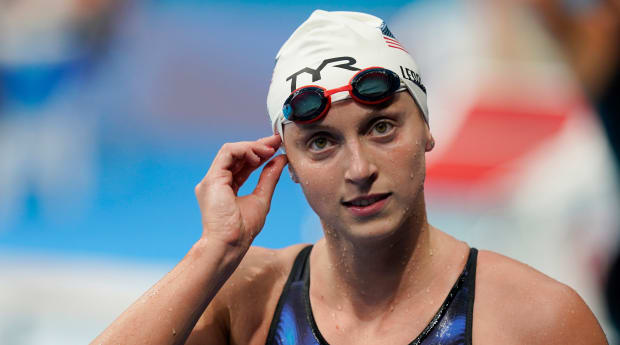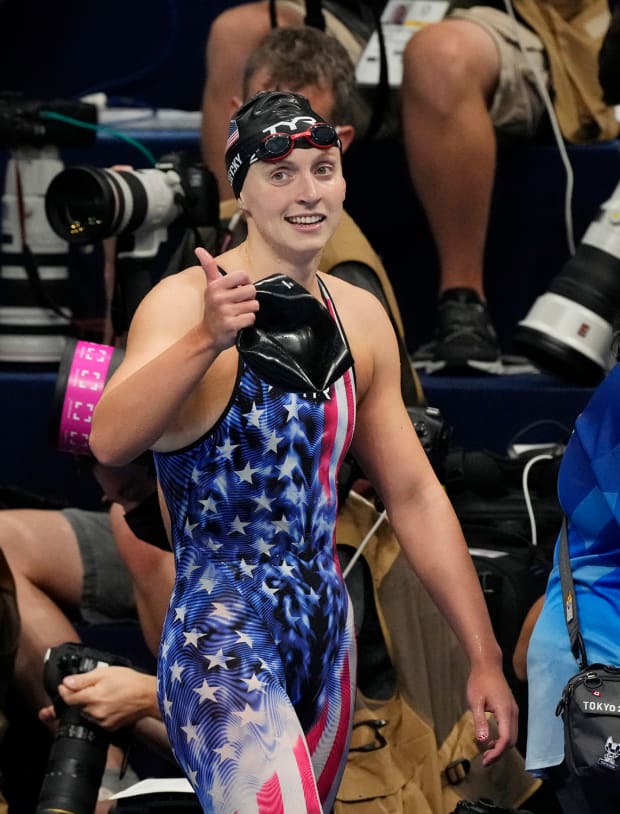The 24-year-old Katie Ledecky is leaving the Tokyo Olympics with two gold and two silver medals. But her historic swimming career is far from over.
Sign up for our free daily Olympics newsletter: Very Olympic Today. You'll catch up on the top stories, smaller events, things you may have missed while you were sleeping and links to the best writing from SI’s reporters on the ground in Tokyo.
TOKYO — And now, Katie Ledecky rests.
So deep into the grind for so long, the greatest and most tireless freestyler of all-time has emerged from that tunnel of commitment at last. Her work here at these Summer Olympics is done: two gold medals, two silver, one fifth-place finish, no regrets.
This has been the hardest of her three Olympics, both in terms of competition and workload. Ariarne Titmus of Australia completed her ascendancy to worthy rival of Ledecky, with the two splitting four matchups—Titmus winning the 200- and 400-meter freestyles, while Ledecky defeated her in the 800 and anchored a 4 x 200-meter relay that upset the Australians while losing gold to the Chinese. And with the addition of the 1,500-meter freestyle to the docket, Ledecky put in a withering 6,200 meters of competition.
Factor in a pandemic that prolonged the run-up to this Olympics by a year, and it’s a lot. She’s ready for life on the other side of a five-year haul, ready to reconnect with the world after isolating herself for more than a year.

She wants to go home—not to her apartment in Palo Alto, but to her childhood home of Washington, D.C., for the first time since before the pandemic took hold. She wants to sleep in her own bed and grab a breakfast sandwich at Izzy’s Deli and see her beloved Nationals play. She has some urgency to visit her grandmothers, one in her 90s and the other her 80s, the latter in declining health. She wants to visit the schools she attended while growing up, to thank them for all the support during these Olympics, because that’s how Ledecky rolls. Her loyalty runs deep and true.
She may stay home for a good while. For now, and for the first time in a very long time, she’s not locked into a schedule. She will not be waking up chasing something. The fall is, for once, presently undefined. “I think I’ll just let this sit for a little bit,” she says.
After her revelatory gold medal in the 800-meter freestyle in 2012 at the London Olympics, Ledecky dove into the next Olympic quadrennial excited to build from there. She couldn’t wait to get going on 2016, and the result was an unbroken line of domination. Then, after the Rio Games, she quickly immersed herself in college life and college training, starting the next chapter quickly.
Now she is ready to exhale. During this nine-year run of greatness, spanning three Olympics and seven gold medals and 10 medals total, she has never let anything sit for an extended period. I asked her what is the longest she has gone without being in the water training, and she said two-and-a-half weeks. “I would guess that would be surpassed this year,” she says.
She wants to go to her old pool, Palisades, and goof around. Maybe play some water basketball and ping-pong with her older brother, Michael. But she also knows what happens when she’s around a pool—the itch returns. It can be ignored for a while, but never denied.
“I get very eager,” she says. Maybe there won’t be “hard laps,” but anyone visiting Palisades in the month to come might find a legend turning in a light workout.
The fact that she can retain that eagerness, avoiding the burnout that looms over so many elite swimmers, is part of her greatness. Until Ariarne Titmus of Australia came along, her only competition was the black line on the bottom of the pool and the clock in her head, as she tried to chase her own unassailable records.
That became increasingly difficult since 2016, when she created her career masterpiece in Rio. Ledecky won four gold medals and one silver there, setting two world records and winning her longest events by jaw-dropping expanses of open blue water. Nobody was close.
She set one world record since then, in the 1,500-meter in 2018. But from that point forward the chase became more futile, despite her unceasing efforts. She always went to the starting blocks expecting to swim better than ever, but rarely was rewarded.

Was the Katie in her 20s ever going to catch the Katie of her late teens? Ultimately, she had to reach peace with herself. She could still be the best in the world in many things without being better than the 2016 version of herself.
The effort and aspiration would never waver, but the willingness to accept lesser performances had to happen. “I started [after 2016] with the goal to go the same times as I did in Rio, and maybe go faster. I gained some perspective over the years of how hard that is. … I wasn’t going to beat myself up if I didn’t go those times again. That was a big realization for me. I recognize the standard I set for myself.”
That realization can fuel her next swimming chapter—and there will be a next swimming chapter. Ledecky has consistently said for a long time that she will swim through the Paris Olympics in 2024, but for some reason that became a news flash in an NBC interview Saturday.
She’s not retiring, or coming close to retiring. She may even hang around until Los Angeles in 2028, intrigued by the opportunity to race in an Olympics on home soil (or in home water, if you will). It seems like an incredibly long time to swim the grueling distances she does, but when the joy comes in the daily effort, that time can pass quickly.
“It is a lot of hard work, but I think I love the training as much, if not more, than the racing,” she said. So she will, once again, embrace the grind—but here’s hoping she sticks to her plan to slow down for longer than usual.
If Katie Ledecky gets in that Palisades Pool in the next month, I hope it’s on a raft and not with cap and goggles on. She’s earned the break.
More Olympics Coverage: